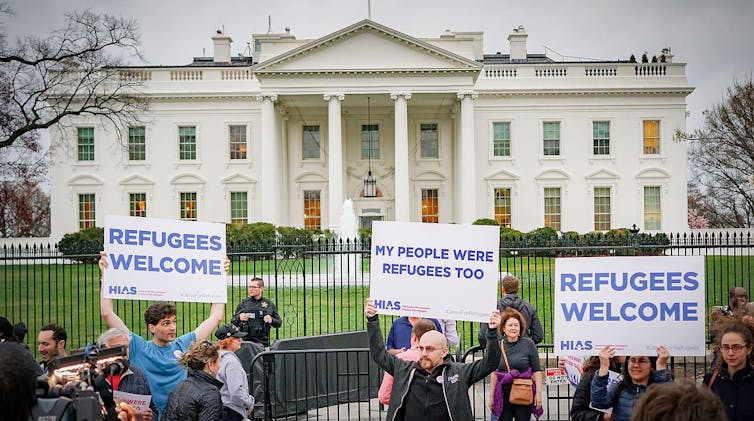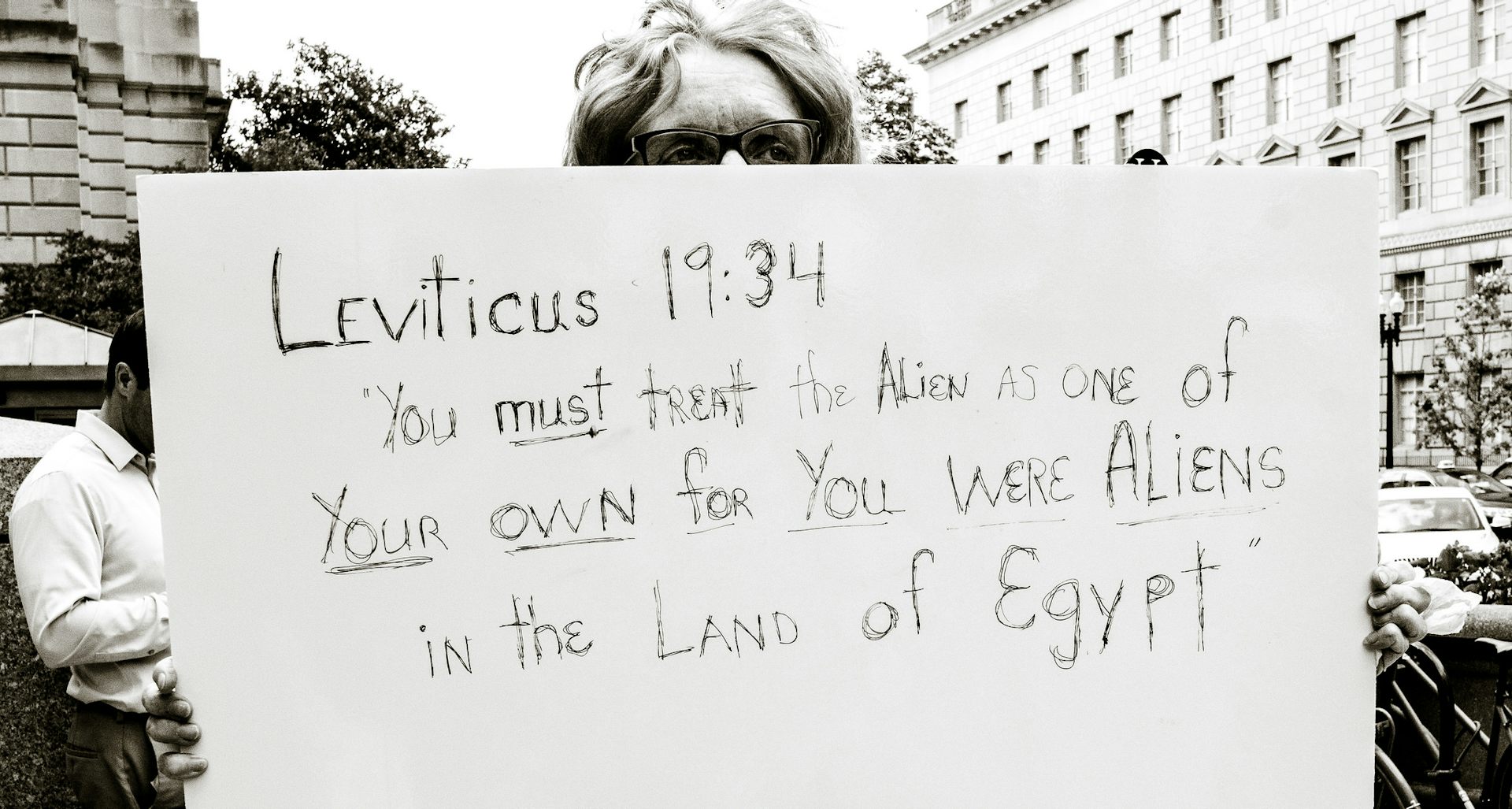Religion and refugees are deeply entwined in the US

Stephanie J. Nawyn, Michigan State University
Robert Bowers lashed out at what he believed to be a Jewish plot to bring more refugees and asylum seekers to the U.S. before allegedly murdering 11 people at the Tree of Life synagogue in Pittsburgh.
Bowers’s claim that HIAS, a prominent Jewish humanitarian organization, was bringing migrants from Honduras, El Salvador and Guatemala northward to commit violence was false. But it is true that many religious communities in the U.S., including American Jews, have long supported refugees and asylum-seeking migrants who arrive in the U.S.
In my research on the nonprofits that resettle and assist these newcomers, I’ve found that while religious communities continue to do this work through faith-based nonprofits and individual congregations, there are signs that some white Christians no longer support this mission.
Religious advocacy on behalf of refugees
The idea of welcoming the stranger is central to Christianity, Judaism and Islam. It originally arose from cultures born in deserts where leaving someone outside the city gates could be a death sentence. Religious leaders of those faiths often connect that ethic to a responsibility to shield refugees and other immigrants from violence and oppression.
Starting in the late 19th century, and during the Holocaust, faith communities appealed to the U.S. government to welcome Jews seeking safety from persecution. They also advocated for allowing Armenians, who were murdered en masse by leaders of the Ottoman Empire, to immigrate to America.
After World War II, an alliance between Protestant, Catholic and Jewish organizations finally swayed policymakers to adopt a more humanitarian-focused U.S. foreign policy. The U.S. then joined with other nations to sign the 1951 Geneva Convention, a U.N. agreement that established the rights of refugees to legal protection.
Among the convention’s main tenets is a global ban on sending refugees back to countries where they will be unsafe. This sometimes requires resettling refugees in a safer country. Faith-based organizations have been partnering with the U.S. government ever since.

The sanctuary movement
Between 1951 and 1980, the government resettled refugees in the U.S. on an ad hoc basis without spending much on assisting them. During this time, faith-based organizations filled in gaps to ensure refugees got off to a good start in the U.S.
Religious groups also advocated for asylum seekers, people who arrived seeking protection without first getting refugee status. Between 1980 and 1991, almost 1 million Central Americans crossed the U.S. border seeking asylum. From the start, the government denied most of their petitions.
Many Christian and Jewish leaders advocated on behalf of these migrants. They preached sermons, lobbied the government and organized protests calling for protecting Central Americans asylum seekers. Hundreds of religious communities provided sanctuary, usually inside houses of worship, and gave them legal support.
In 1985 the Center for Constitutional Rights sued the federal government on behalf of the American Baptist Church, Presbyterian Church USA, the Unitarian Universalist Association, the United Methodist Church and four other religious organizations, claiming discrimination against Salvadoran and Guatemalan asylum seekers. The government later settled the class action lawsuit.
Faith-based nonprofits supporting refugees today
Ever since Congress passed the 1980 Refugee Act, creating the current system of refugee resettlement, U.S. faith-based organizations have played a central role in it.
There are nine national voluntary agencies that work directly with the government, six or which are faith-based. One is Jewish, one Catholic, one evangelical Christian and three are mainline Protestant. These groups arrange for refugees to find housing, land jobs and enroll in English classes. They do so regardless of the newcomers’ own religions or their countries of origin.
In my research, I have found that staff at faith-based organizations commonly use religious rhetoric to justify their work and to describe their commitment to that work.
At the same time, religiously based refugee organizations frame their efforts using interfaith language. They invoke the ethical imperative to provide asylum and refuge in ways that cross-cut multiple religious traditions as they collect and disburse money and household goods – and mobilize volunteers.
I found that staff at faith-based organizations use religious rhetoric in ways that are explicitly inclusive, being careful not to exclude refugees from other religions.
“The Jewish dimension is helping people realize that America is a place that welcomes all, and helping people that have come from a land where maybe sometimes being a Jew was considered worse than dirt,” a director of a local office of HIAS, formerly known as the Hebrew Immigrant Aid Society, told me. “Do we apply those same kinds of principles to other communities that we help? Absolutely.”
The director of a Catholic Charities office echoed that sentiment. “We have a saying,” he told me. “We help people not because they are Catholic, but because we are.”
Most Americans in this movement support organizations that share their own faith. But these nonprofits also form interfaith networks that support refugees and asylees. Secular groups do this charitable work as well.
Changing religious politics
Despite the deep foundation of religious belief and morality for granting asylum, this connection may be fraying, at least for some communities. In response to a record number of people displaced globally, especially nonwhites and Middle Easterners, I’m seeing signs that the moral framework supporting asylum is giving way in some quarters to support for restrictive policies that avoid any moral or international obligation to asylum seekers.
This became clear when the Trump administration enacted its “zero tolerance” policy, which it said justified arresting anyone crossing the border without documentation – including people with babies and toddlers. Government agents and contractors subsequently separated more than 2,650 children from their parents, sparking outrage.
Many faith leaders spoke out against the child separation, like prominent evangelical leader Franklin Graham, without directly criticizing aggressive border enforcement. But many have been more pointed in their comments, specifically calling out immigrant exclusion as antithetical to their religious beliefs. Mainline Protestant, Jewish, Mormon, Catholic and evangelical Christian groups all released statements against tighter immigration enforcement itself.
What is unusual is that some conservative Christian groups have begun to lobby in favor of strengthened immigration enforcement. This is a break from the past. While there have been theological differences between conservative and mainline Protestant Christians on a number of issues, welcoming the stranger had been one point upon which Christians generally agreed.
Race and racial politics are intertwined with this split. There now appears to be an inverse relationship in the U.S. between religiosity and support for asylum among white Americans. In a Pew survey conducted in May 2018, only 43 percent of white Protestants and 25 percent of white evangelical Christians thought that the U.S. had a responsibility to accept refugees.
Conversely, 63 percent of black Protestants and 65 percent of the religiously unaffiliated thought that the nation has that responsibility. Another recent Pew survey, which didn’t sum up the perspectives of Jews or Muslims, showed broad support for a border wall among white evangelicals and mainline Protestants, and opposition among black Protestants, Hispanic Catholics and the religiously unaffiliated.
It’s unclear whether this represents a downward trend in white Christian support for people seeking safe haven. Following the mass murder of Pittsburgh Jews, it will be important to watch changes in attitudes toward refugees and other migrants.
![]()
Stephanie J. Nawyn, Associate Professor of Sociology and Co-Director of the Center for Gender in Global Context, Michigan State University
This article is republished from The Conversation under a Creative Commons license. Read the original article.

















